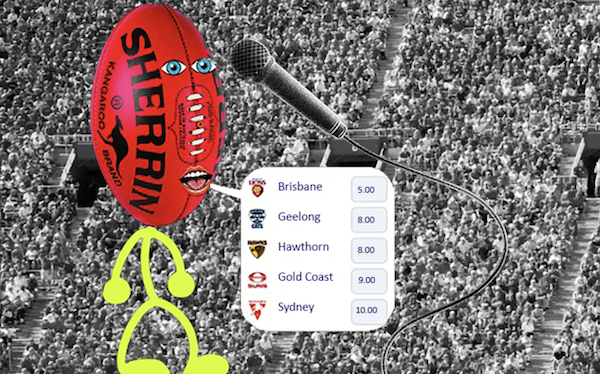Sports podcasters who “ought to know better” are enthusiastically promoting online gambling (with all its consequences). Andrew Gardiner reports.
Still looking for that tiny corner of Australian society, politics and sports media our ubiquitous gambling industry hasn’t reached? Here’s a pro tip: sports podcasts aren’t where you’re likely to find it.
Problem gambling has established causal links with depression, anxiety and suicide. Yet sports podcasters – some of whom revealed their own experiences of mental illness not long ago – have been happy to take the money and shut up about problem gambling.
Take former AFL ruckman/forward Daniel Gorringe (who revealed last year he “wanted to be injured” to avoid the pressure of performing up to his status as a top 10 draft pick) and his former co-host (and teammate) Dylan Buckley, who spoke of “vomiting and intrusive thoughts” pre-match, at one stage wishing he would be hurt on-field “and not have to play for six weeks”. Gorringe hosts Dan Does Footy, Australia’s top sports podcast.
Axed by Carlton in 2017, and out of the AFL, Gorringe found himself with “nothing in the bank, no purpose anymore … and it got to a real bad spot where I was seriously considering not wanting to be here”.
An ambassador for mental health training program Tackle Your Feelings, he shows clear empathy for those who have been on the journey – common among athletes – of performance anxiety and severe depression.
The elephant in the studio
But what of others among the one in six Australians who seriously contemplate suicide, who weren’t elite athletes and took a different path to that same dark place? On air at least, the now-feuding Gorringe and Buckley ignore the elephant in the studio: problem gambling, a known suicide precursor.
In fact, Gorringe and others actively enable it.
“Together we ride the wave of each bet,” he told Sportsbet’s website. That’s right, readers: Daniel Gorringe, ‘independent’ podcaster with experiences of suicidal ideation, is the online face of Sportsbet, a leading gambling website accused of promoting a known cause of suicide.
Sportsbet also sponsors Gorringe’s NRL counterpart, Get ‘Em Onside, where the website’s trader, Sean, previews the weekend’s rugby league betting action. Its sponsorship dollars don’t end when the footy does, with popular cricket podcast The Grubs also a member of the vast Sportsbet stable.
Get ‘Em Onside
In return, Gorringe and former NRL playmaker Joel Caine (from Get ‘Em Onside) provide insights, tips, and betting analysis via the company’s online tipping platform.
Not to be outdone, Buckley co-founded Producey, a podcast producer, and Clubby, a sports network which “helps brands reach one of the hardest audiences to market to and connect with – the 18-34 year old male”. There, he was joined by Sportsbet’s former head of partnerships, Adam Pattison.
Podcasts on the Clubby roster include 200 PLUS, another Sportsbet cohort which went to extraordinary lengths to promote the thorny sport of greyhound racing by buying an actual greyhound, Conqueror, and offering shares in the dog to its audience. “Keep up to date with all things racing and the people’s dog, Conqueror!”, the podcast proudly proclaims.
Another Clubby stablemate, comedian Broden Kelly (who hosts The Footy with Bro), explains gambling’s sway over sports podcasters. Success in that medium is “hard to sustain unless you’re at the ABC or take gambling money”, he posted.
“Gambling companies target vulnerable creators and their ad space”.
Media and law graduate ‘Tim’ of Adelaide, who brought MWM’s attention to what he called Gorringe and others’ “hypocrisy” on gambling, hit rock bottom himself just 12 months ago. “I attempted suicide in October 2024 and I am so glad that I failed; I love my life (and) am now at a stage where I feel I can help others”, he said.
Saturation gambling ads in sports (which target 18-34 year old males like Tim) are a particular peeve of his. Tim finds it hard to believe young men like Gorringe, who contemplated suicide, can promote activities that place others in danger of the same fate.
He also loathes politicians who effectively turn a blind eye. “MPs from both of the major parties take blood money from gambling websites, so they’re allowed to operate unregulated. It’s disgusting,” he said.
Yet … gambling ad reforms stalled
Canberra has yet to formally respond to the 31 recommendations in 2023’s ‘You win some, you lose more’ report, such as an hour-long blackout on ads before live sports broadcasts, and a limit of two ads per hour outside of this. Nonetheless, arguments for some kind of regulation seem compelling: the Victorian Responsible Gambling Foundation says there were 948 gambling ads daily on the state’s free-to-air television in 2021.
But Tim says any new regulations on ads won’t impact the gambling companies’ online presence, adding that whatever rules emerge will do little to slow down the juggernaut that is online sports betting.
Tim and MWM sent a number of questions to Clubby Sports, the most urgent of which were whether or not the company had put in place any strategies to mitigate the downside of sports betting, and what it was doing to support young males struggling with their mental health. We had not heard back from them by publication time.
“I watched (September’s AFL Grand Final) with 20 of my best mates”, Tim said. “About 80 per cent of the room placed bets on the game through the Sportsbet app”.
“That was harrowing”.
Isolated … trapped
A case study on the influence and impact of online sports betting is ‘Jack’, whose shocking story aired on The Imperfects podcast in 2023. Listeners were shocked by some of the tactics employed by companies to exploit ’Jack’s’ vulnerability.
“When I was at my worst and I didn’t have much money to my name … they would call me every couple of days”, ‘Jack’ said. “I had a personal contact at the betting company and they’d call me and they’d say, ‘Jack if you deposit $100, we’ll give you $300 extra dollars, could you do that now?’”.
“I was living pay to pay, as a gambler I would get sucked in. So I’d deposit (the money) and that money would last maybe a couple of hours max and then I’d be back to square one”.
“At one point, I got a phone call: ‘Jack, do you enjoy your AFL? We can see you bet on it quite a bit. Do you want a couple of tickets to the footy this weekend? You can come into the box’.”
“Because I felt so isolated and trapped from my gambling (addiction), having that person (make an offer like that) made me feel special”. But ‘Jack’ knows the low points, too, where that short-term buzz of excitement gives way to a brutal reality of financial strain, relationship problems, mental health decline, stress-related health issues, potential legal entanglements and, yes, thoughts of self-harm or suicide.
‘Jack’ is just one of the 9.3 per cent of Australian men (and rising) who bet on sports, a large number of whom wind up attempting suicide. “(It’s) the sure way of getting nothing for something”, American playwright Wilson Mizner once wrote.
The process of recruiting vulnerable Australians like Jack begins with the galaxy of retired stars and media personalities on the sports gambling payroll, happily providing tips or producing content on anything from television screens to streaming audio. But Tim’s especially venomous when it comes to podcasters with mental health histories of their own.
“Daniel Gorringe contemplated suicide, and Dylan Buckley was in a tough place too. They ought to know better”.
Revealed: 239 million reasons gambling reforms are being smothered
An Adelaide-based graduate in Media Studies, with a Masters in Social Policy, I was an editor who covered current affairs, local government and sports for various publications before deciding on a change-of-vocation in 2002.


